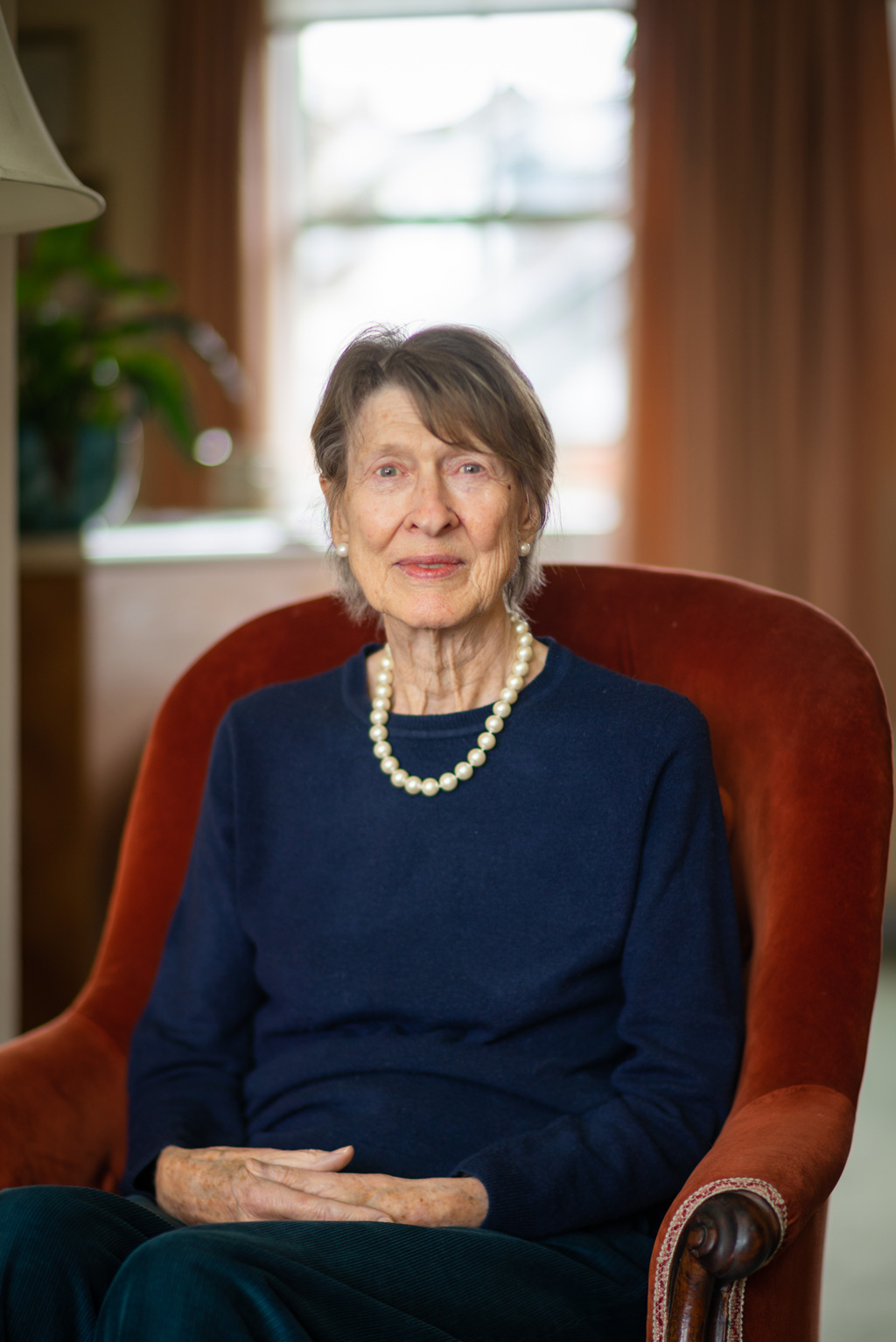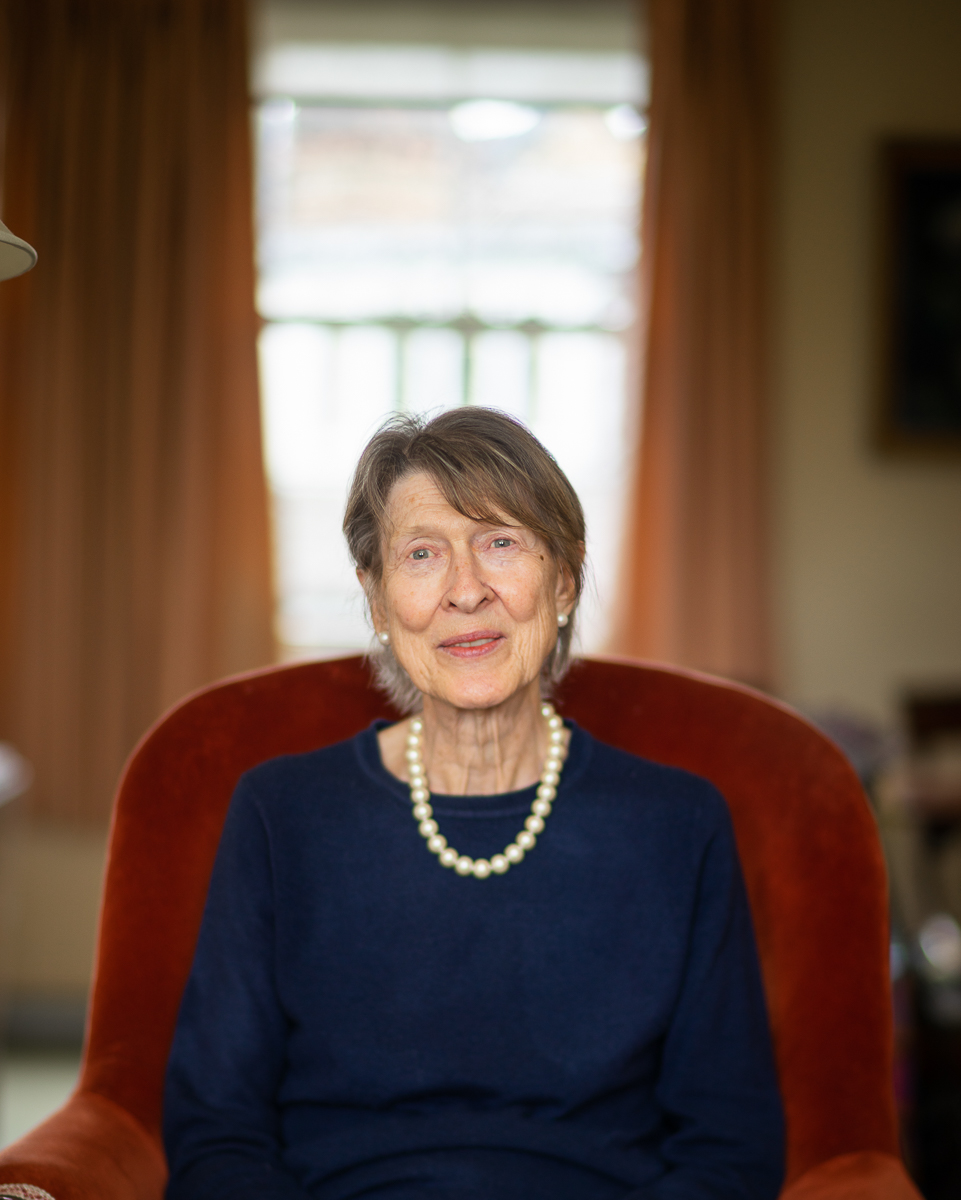Mary Mackie, a former ISH Governor, and active member of the community, shares her professional experience and career highlights working with the Commonwealth Secretariat.
Tell us about yourself…
I was a farmer’s daughter brought up in Northeast Scotland, which I think was a good beginning. My father and my mother were quite liberal people. We had overseas people come and visit and so on, so I had quite an open childhood. I didn’t complete my degree for various reasons, and my father was supporting me, so I took a secretarial course and launched myself into the world. I travelled for a year around the States with a friend doing temporary work, and that was interesting and good for us to see another part of the world. I do think travel makes a huge difference in people’s lives and how they view other people.
When I came back, I did some temporary work, I had a job as an estate agent and then at an advertising agency. But after a few years, I wasn’t learning much, so I thought what do I do? I’d been offered all these jobs and chosen the wrong one. Then I saw an advert in The Times for the Commonwealth Secretariat. I’ll be perfectly honest, I knew nothing about the Commonwealth or the Secretariat, but luckily I was the right fit at the right time. It was with the Deputy Secretary General Sri Lankan Tilak E. Gooneratne so that’s where it all started. When he moved on, I worked for Geoffrey Wilson, who was then offered the Chairmanship of the Race Relations Board and asked me to go with him.
It was a real insight and probably very good for me, but it was all complaints, there was no happiness, no international feel, and I missed that. I was asked to go back by Emeka Anyaoku who was the Director of the Political Division, so I went back to the Secretariat and then just moved on and up and was there for about 30 years. And that’s where I got my international experience, working with people from the Commonwealth is huge. I have lots of lovely friends, but they’re all scattered now, that’s the only unfortunate thing.
How did you get involved with ISH and what is your connection now?
The terrible thing is I can’t remember how I got the contact with ISH. John Burgh, who was then Chairman asked to meet me, so we had this nice chat, and he said, ‘Mary there’s no doubt, I want you to come and be a governor.’ Which was lovely, and the rest was history. It was just my cup of tea, meeting people and working with other governors. Then I was on the committee that dealt with complaints and things between the staff and the management, and that was quite fun. Mostly I took the students’ side. I loved it, I would’ve loved to have stayed on but I’d been there a long time. I try to come to events now, and I keep in touch.
What type of work were you doing with the Secretariat and how was your experience working there?
I started off as a secretary and worked for several different people, but the last person was the Commonwealth Secretary-General Chief Emeka Anyaoku. I worked for him as Director, then Deputy Secretary General, then he put his name in for Secretary General and I moved up with him and became his Personal Assistant. We had a big office and I shared it with two others, and I was Second in Command. I met all kinds of people. I met Nelson Mandela three times, and I organised a dinner for him in London. We went to Cuba and met Fidel Castro.
I met such a fascinating number of people. One of my heroes is Julius Nyerere of Tanzania. He was such a sharp wit and such an on-the-ball person, and at Heads of Government meetings, he would have a quick quip and catch people up on things. And Mandela, after all, he’d been through, to look forward not back – it was just great. I remember going on my first trip in ’71, to a Singapore Heads of Government meeting, it was my first trip out beyond Europe, and it was so exciting.

What was it in particular that you loved about the work that you were doing?
I think it was, I very much believe, (that’s why I’m very pro-Europe for instance) that we should get together. The more we communicate the less chance there is of things going wrong. And that’s why I think Britain should stay together, we should’ve stayed with Europe. The Commonwealth meets every other year, Heads of Government and Foreign Ministers meet, Education Ministers meet, and it’s like the United Nations. A lot of people decry it but it’s the only place that people can meet and talk to each other, and understand each other’s problems, face to face, rather than the stuff you read.
And I think that’s the importance of us getting together, and understanding each other’s problems. And once you do that, once you’ve travelled to people’s countries, you’re never going to feel the same.
If you were blind and sitting next to someone, the first thing you wouldn’t think of wouldn’t be their colour, it would be what kind of person they are, you know? This is why I really think racism is evil. It was obvious that we were all equal when I worked at the Secretariat, you could see it, these bright people from all over the Commonwealth.
How did you find navigating this space as a female professional?
I think that I was always so busy, and had a close family, that it’s only since I’ve retired really that I’ve felt really how badly women are discriminated against. And yet, look at some of the Heads of Government who are women, and how well they’ve done. It’s a bit the same as colour. I noticed the BBC has more and more diversity now in our programmes, and the more we do that, the more we get used to it, and the less it’ll be a problem.
I think being a positive woman, and I am quite tall, and I carry myself quite well, and I think people don’t hassle with you if you’re like that. In certain instances, being a woman can be an advantage, but overall, we have quite a long way to go. I wasn’t really aware of discrimination in some of the countries that we went to, although there was one occasion, where Patsy Robertson who was Jamaican, and I, were put at a table the far outside, although she was senior to the chap that was sitting with the Secretary-General at the table – because we were women!
Were there any particular highlights or career moments that really stood out to you?
The trip to Cuba stands out very much in my mind because the Americans were so against it so we couldn’t fly to America to go from there. Cuba wasn’t a member of the Commonwealth, but the Ambassador here said to the Secretary-General, ‘Well you could join the Caribbean Association but you have no qualifications for joining the Commonwealth.’ And she said, ‘Would you be prepared to visit Cuba?’ and he said ‘I’d love to but it’s not a Commonwealth country so I’d need to be in the area.’
A couple of years later we were going to a meeting in Trinidad, and luckily, I was on a trip with a Caribbean friend just the three of us, and we went to Cuba. We were met by the Commonwealth Ambassadors, and they had a reception for us and everything. When we arrived, we went into this room, then Castro came in and I tried to take a photograph, but I was so excited I jammed my camera. We sat down and had this interesting meeting. Then when we went out there was a sea of cameras taking photographs, but my camera started to work again so I took a photo of the Secretary-General and Castro. When the Secretary-General moved away my colleague stepped forward smartly and I took that photo, and then the Secretary-General said to me ‘Mary, pay attention!’ I was a junior member here. Then Castro said, ‘She too should have a photo with me.’
Now when people come to visit me and see photos, they go, “Is that, is that Castro?”
I’ve got a whole lot of photographs in my chest of drawers. I have one with Mandela, he was just lovely, what a gentle character.
Nigeria was the first place he visited, and we were in the audience, and when we came onto the stage, he was just this icon. Afterwards, there were so many people wanting photographs I felt a bit guilty. Then we visited him in South Africa on one trip, and then he was coming to London, and the Secretary-General wondered what he could do to help South Africa. So he decided to have dinner and invite the Heads of all the companies who do business with South Africa. Mandela made a lovely speech, apologised for being late, and shook hands with everybody.
What would you like to say to the future generation of graduates, and scholars?
I think a good education obviously counts, and travel helps. Try and be positive. Maybe try not to prejudge, sometimes you get an idea in your head and then it’s not right. One last thing, one of the things the Secretariat used to say is “communication is the lifeblood of the Commonwealth”. I think communication is the lifeblood of the world.
Have you also read these articles?

